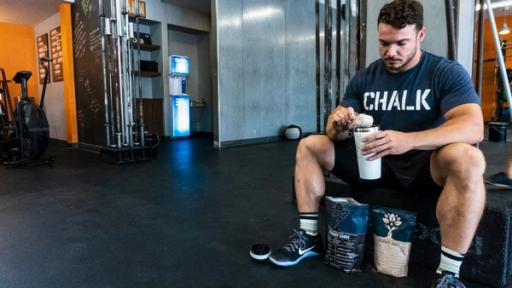Tracking protein intake can be a struggle. Maybe you’re trying to lose weight or improve your body composition. Perhaps you want to boost your performance, recover from an injury, or build muscle. No matter your goal, tracking protein can help you get there. Figuring out how to track protein accurately can feel overwhelming. With so many apps, how do you find the best protein tracker app for your needs? This article will help you answer that question. You’ll learn how protein trackers work, discover their benefits, and find the best app for your goals.
Goldi AI’s calorie tracker can help you reach your goals faster by making tracking calorie easy and stress-free. You can effortlessly stay on top of your protein intake to unlock peak performance with the best apps to track macros.
Why Tracking Your Protein Intake Is Important

Are you getting enough protein in your diet? While you may watch your calorie, sugar, and salt intake, you should also ensure you are ingesting enough protein. It plays a key role in creating and maintaining every cell in our bodies. It fuels our cells and powers our bodies.
Nancy Waldeck, chef and dietitian at Thomas F. Chapman Family Cancer Wellness at Piedmont, points out that our bodies do not store protein. “It is important for individuals to consume protein every day. Daily protein intake plays a role in keeping your cells in good shape and should be part of your daily health maintenance plan.” Protein comprises amino acids, commonly known as building blocks, because they are attached in long chains. It is also considered a “macronutrient,” meaning you need relatively large amounts to stay healthy.
The Role of Protein in the Body
Here are five compelling reasons why you should make sure you are getting enough protein every day:
1. Build
Protein is an essential building block of:
- Bones
- Muscles
- Cartilage
- Skin
Your hair and nails are composed mainly of protein.
2. Repair
Your body uses it to build and repair tissue.
3. Oxygenate
Red blood cells contain a protein compound that carries oxygen throughout the body, helping supply the body with the nutrients it needs.
4. Digest
About half the dietary protein you consume daily is used to make enzymes, which aid in digesting food and making new cells and body chemicals.
5. Regulate
Protein plays a vital role in hormone regulation, especially during the transformation and development of cells.
Protein’s Role in Recovery and Weight Management
Eating high-protein foods has many fitness benefits, including:
- Speeding recovery after exercise and/or injury
- Reducing muscle loss
- Building lean muscle
- Helping maintain a healthy weight
- Curbing hunger
Waldeck points out another benefit of protein — it fills you up faster. “Protein plus fiber keeps us full longer, which means you don’t feel the urge to eat as often. This helps keep weight down while fueling our cells with the necessary nutrients.”
How Much Protein Do I Need a Day?
The Recommended Dietary Allowance (RDA) for protein is a modest 0.8 grams of protein per kilogram of body weight or 0.36 grams per pound. The RDA is the amount of a nutrient you need to meet your basic nutritional requirements. It’s the minimum amount you need to avoid getting sick—not the specific amount you should eat daily.
How to Calculate and Adjust Daily Protein Intake for Different Life Stages and Activities
To determine your daily protein intake, multiply your weight by 0.36 pounds or use this online protein calculator. Daily protein intake for women For a 50-year-old woman who weighs 140 pounds and is sedentary (doesn’t exercise), that translates into 53 grams of protein daily.
During pregnancy, protein needs of women go up. Experts recommend 75 to 100 grams of protein daily for the developing fetal tissue and the enlarging placental, breasts, and blood supply. You should check with your doctor about your specific protein needs.
Protein: Is More Better?
A relatively active adult’s daily protein intake to meet the RDA would supply as little as 10% of his or her total daily calories. In comparison, the average American consumes around 16% of his or her daily calories in the form of protein from both plant and animal sources. But is that too much? For some people, higher daily protein intake may have potential benefits in preserving muscle mass and strength.
Timing and Quality: Optimizing Protein Consumption for Maximum Benefits
How and when you consume protein also influences its effectiveness. Some studies in the summit reports suggest that protein is more effective if you space it out over the day’s meals and snacks rather than loading up at dinner like many Americans do.
Over the last several years, the public health message has shifted away from desired percentages of:
- Protein
- Fats
- Carbohydrates
For example, the current Dietary Guidelines for Americans emphasize eating healthier, protein-rich foods rather than concentrating on specific daily protein amounts.
Think Protein Package, Not Percentage
For daily protein intake, think “protein package.” Research on how much protein is optimal for good health is ongoing and far from settled. For example, the value of high-protein diets for weight loss or cardiovascular health remains controversial.
Choosing High-Quality Protein Sources: Beyond Meat and Dairy
Before ramping up your daily protein intake, consider a few essential things. Don’t read “get more protein” as “eat more meat.” Beef, poultry, and pork (as well as milk, cheese, and eggs) can undoubtedly provide high-quality protein, but so can many plant foods, including:
- Whole grains
- Beans and other legumes
- Nuts
- Vegetables
It’s also important to consider the protein that invariably comes along with the protein “package,” such as:
- Fats
- Carbohydrates
- Vitamins
- Minerals
- Other nutrients
Aim for protein sources that are low in saturated fat and processed carbohydrates and rich in many nutrients.
Balancing Protein Intake Without Compromising Overall Nutrition
One more thing: If you increase protein, dietary arithmetic demands that you eat less of other things to keep your daily calorie intake steady. The switches you make can affect your nutrition for better or worse.
For example, eating more protein instead of low-quality refined carbohydrates, like white bread and sweets, is a healthy choice—though the total protein package also affects how healthy the choice is.
The Role of Protein in Health and Weight Management: Myths and Facts
“If you are not eating much fish and you want to increase that—yes, that might improve the overall nutrient profile that would subsequently improve your health,” says registered dietitian Kathy McManus, director of the Department of Nutrition at Harvard-affiliated Brigham and Women’s Hospital. “But I think the data are pretty strong against significantly increasing red meat, and certainly processed meat, to get protein.”
If weight loss is your main concern, trying a higher-protein diet is reasonable, but don’t expect it to be a panacea. “Patients come to me all the time asking if more protein will help them in weight loss,” McManus says. “I tell them the verdict is still out. Some studies support it, some studies don’t.”
14 Best Protein Tracker Apps

Tracking your daily protein intake can help you reach your health and fitness goals. For example, if you want to build muscle, a protein-rich diet can support:
- Recovery from exercise
- Promote muscle growth
- Help you maintain your gains
If you’re going to lose weight, increasing your protein intake can help you feel fuller and maintain muscle as you lose fat.
Simplifying Protein Tracking: How Calorie-Tracking Apps Can Enhance Your Diet
Tracking protein can also help improve your overall dietary quality and ensure you’re getting enough of this vital macronutrient. One of the easiest ways to monitor protein intake is by using a calorie-tracking app.
These apps allow you to log your food intake to see how much protein (and other nutrients) you consume. Most people find it tedious to log their food intake manually, but many apps have features that make it easy and convenient. For example, you can scan barcodes of packaged foods to instantly find their nutritional content and log them into your diary.
Enhancing Protein Tracking with Smart Features: Food Search, Image Recognition, and Personalized Insights
You can also search for specific foods or meals others have already logged to eliminate redundant tasks. Many apps even allow you to take pictures of your food for automatic nutrient detection. A protein tracking app can also help you stay on track with your goals by providing personalized insights and recommendations based on your dietary preferences and lifestyle.
1. Goldi AI: The Future of Calorie Tracking
Goldi AI transforms calorie tracking with our cutting-edge AI technology. Just snap a photo of your meal, and we’ll do the rest. Our app combines your phone’s depth sensor with advanced AI models to:
- Analyze food volume
- Identify ingredients
- Instantly calculate calories, protein, carbs, and fat content
With 90% accuracy on visible foods and multiple tracking options, we’ve made nutrition tracking effortless. Options include:
- Barcode scanning
- Food label recognition
- Manual description for complex items like smoothies
Gone are the days of tedious manual logging calorie-tracking apps. Whether scanning a full meal or a quick snack, Goldi AI gives you accurate nutritional information in under 15 seconds. Plus, our AI learns from your feedback, continuously improving its accuracy.
Stay on track with personalized insights and brilliant reminders. Goldi AI makes achieving your fitness goals simpler than ever. Track your calories with your camera using Goldi AI’s calorie tracker today.
2. MyFitnessPal: The Social Butterfly of Calorie Tracking Apps
MyFitnessPal is a popular comprehensive fitness and nutrition app that excels in macronutrient tracking. Its extensive food database, barcode scanner, and calorie tracking features make it a powerful tool for managing protein intake.
MyFitnessPal also offers a social aspect, allowing users to connect with friends and family for support and motivation.
3. Lose It!: The Goal-Oriented Calorie Tracker
Lose It! is another highly rated app for weight loss and calorie management. Its intuitive interface and personalized recommendations make it user-friendly. Lose It! allows users to set specific protein goals and track their progress. It also offers a variety of workout plans and fitness trackers.
4. MacroFactor: The Science of Macros
MacroFactor takes a more scientific approach to macronutrient tracking. It utilizes a personalized algorithm to calculate optimal macronutrient ratios based on:
- Individual goals
- Activity levels
- Body composition
MacroFactor provides detailed insights into macronutrient needs and offers flexible meal-planning options.
5. Cronometer: The Detailed Nutrient Tracker
Cronometer is a comprehensive nutrition tracking app that stands out for its detailed nutrient analysis. It goes beyond calorie tracking, providing insights into essential:
- Vitamins
- Minerals
- Macronutrients
Cronometer is a valuable tool for individuals seeking to optimize their protein intake and overall nutritional health.
If you already track your fitness metrics with a Fitbit or Apple Watch and want to track your macros, look no further than Cronometer. The app can connect to the fitness-tracking device or app you already use and give you personalized feedback on your health instead of just your food intake.
6. FatSecret: The Popular Choice for Calorie Tracking
FatSecret is a popular app for calorie and macronutrient tracking. It offers an extensive food database, a barcode scanner, and meal-planning features.
FatSecret allows users to set protein goals and track their progress. It also provides insights into nutritional content and allows social interaction with other users.
7. MyPlate Calorie Tracker: The User-Friendly Calorie Counter
MyPlate Calorie Tracker is a user-friendly app that allows easy calorie and macronutrient tracking. Its intuitive interface and simple design make it accessible to users of all levels. MyPlate Calorie Tracker offers a variety of features, including:
- Food logging
- Recipe suggestions
- Progress tracking
8. Protein Tracker: The App for Protein Panickers
As the name suggests, Protein Tracker is specifically designed for protein tracking. It allows users to set protein goals, monitor their intake, and receive personalized recommendations.
Protein Tracker also offers a variety of workout plans and fitness trackers, making it a comprehensive fitness app.
9. Muscle Gainer: The App for Serious Lifters
Muscle Gainer is an app tailored to individuals seeking to build muscle mass. It provides personalized workout plans, nutrition guidance, and protein tracking features.
Muscle Gainer also offers a community forum where users can connect with others and share their experiences.
10. MyNetDiary PRO: The Premium Nutrition Tracker
MyNetDiary PRO is a premium tracking feature and nutrition-tracking app with:
- Advanced calorie
- Macronutrient
- Micronutrient
It provides detailed insights into nutritional content, allows for meal planning, and offers personalized recommendations.
11. Fitocracy Macros: The Fit Nerds Macros Tracker
Fitocracy Macros is an app that combines fitness tracking with macronutrient management. It allows users to track:
- Workouts
- Calories
- Macros
Fitocracy Macros also offers a social aspect, allowing users to connect with others and share their fitness journey.
12. LifeSum: The Best Meal Planning App for Macro Tracking
One of the best ways to maintain your macros is to plan your meals. With so many options, narrowing it down to a weekly menu can be challenging. That’s where Lifesum can come in handy.
The app offers seven—to 21-day meal plans with shopping lists and recipes. As you input your meals, the app calculates your calories and macros so you can ensure you’re staying on track with your goals.
13. FoodNoms: The Best App for Tracking Mixed Meals
If your diet includes freshly prepared meals and pre-packaged products, you’ll want to download FoodNoms. The app lets you log your food intake and has a built-in barcode scanner to eliminate any guesswork regarding packaged goods.
In addition to tracking your macros, the app gives detailed nutritional feedback about your food choices.
14. My Macros+: Arobust Macro Tracker
Take your macro tracking to the next level with My Macros+. The app gives you a daily nutritional breakdown that considers your:
- Macros
- Calories
- Body measurements
It also helps you hit your goals through check-ins with a personal macro coach.
Choosing the Right Protein Tracker App

Features and Functionalities: What Do You Want in a Protein Tracker App?
With so many protein diet apps available, choosing the right one can be challenging. Here are some factors to consider when making your decision. Different apps have different features, so determine which are most important to you, such as:
- Macronutrient tracking
- Food logging
- Recipe suggestions
- Progress tracking
- Personalized recommendations
User Interface: Make Sure You Can Navigate the App with Ease
Tracking your protein intake shouldn’t feel like a chore. To ensure this, look for an app with an intuitive and user-friendly interface that is easy to navigate and use.
Food Database: Select an App with a Comprehensive Food Database
When selecting a protein tracker app, picking one with a comprehensive food database is crucial. This will make it easier to log your meals and snacks. Choose an app with a food database that includes your favorite foods and dietary restrictions for the best results.
Social Features: Find a Community to Help You Stay Motivated
If you value community support and motivation, consider a protein tracker app with social features that allow you to connect with others. These features make it easy to share your progress, ask questions, and find group support to help you reach your goals.
Price: Free or Premium? Choose What Works for Your Budget
Some protein diet apps are free, while others offer premium versions with additional features. Determine your budget and choose an app that fits your needs. Remember that even with free apps, you may have to pay to unlock certain features.
Maximizing Your Protein Tracking: Expert Tips for Effective Use of Protein Diet Apps
It’s essential to use protein diet apps effectively to maximize their benefits. Here are some tips to help you get started.
Set Realistic Goals: Choose Achievable Protein Targets
When starting, it’s easy to feel ambitious and set lofty goals. Instead, aim for achievable protein goals based on your individual needs and activity levels. Avoid setting overly ambitious goals that can lead to frustration and derail your progress.
Track Consistently: Log All Meals and Snacks
To get the most out of your app, you must consistently track your protein intake, logging all meals and snacks. This will provide a clear picture of your protein consumption and allow adjustments.
Be Mindful of Food Choices: Focus on Healthy Protein Sources
Not all protein sources are created equal. Choose healthy and nutritious protein sources and avoid processed or high-fat options. Instead, focus on:
- Lean meats
- Fish
- Poultry
- Legumes
- Nuts
- Seeds
Stay Hydrated: Drink Plenty of Water
Drinking plenty of water throughout the day is essential for overall health and can help prevent dehydration, affecting protein metabolism.
Seek Professional Guidance: Get Personalized Help If You Need It
If you have any underlying health conditions or specific dietary needs, consult a registered dietitian or other healthcare professional to get personalized protein intake and diet planning advice.
Track Your Calories within Less Than 15 Seconds with Our Calorie Tracker App
Goldi AI transforms calorie tracking with our cutting-edge AI technology. Just snap a photo of your meal, and we’ll do the rest. Our app combines your phone’s depth sensor with advanced AI models to:
- Analyze food volume
- Identify ingredients
- Instantly calculate calories, protein, carbs, and fat content
With 90% accuracy on visible foods and multiple tracking options, we’ve made nutrition tracking effortless. Options include:
- Barcode scanning
- Food label recognition
- Manual description for complex items like smoothies
Gone are the days of tedious manual logging calorie-tracking apps. Whether scanning a full meal or a quick snack, Goldi AI gives you accurate nutritional information in under 15 seconds. Plus, our AI learns from your feedback, continuously improving its accuracy.
Stay on track with personalized insights and brilliant reminders. Goldi AI makes achieving your fitness goals simpler than ever. Track your calories with your camera using Goldi AI’s calorie tracker today.



